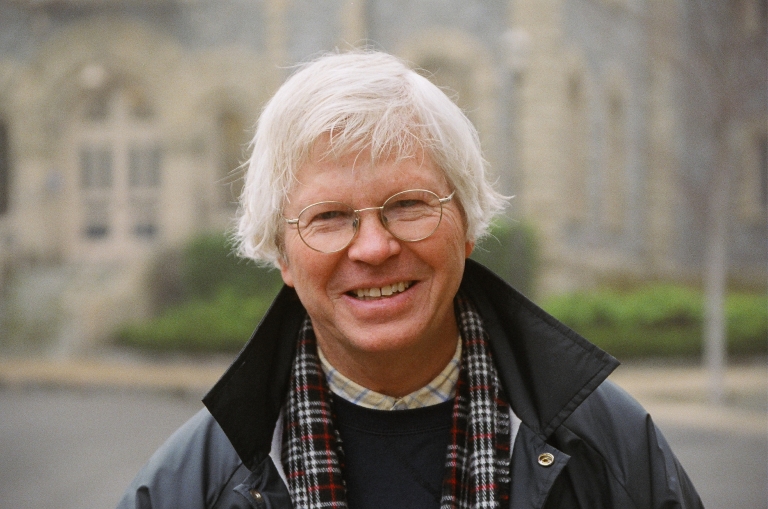
Since graduating from the Robert H. McKinney School of Law in 1972, Mark Shaw has seen his career move in several directions. He has worked as a noted criminal defense lawyer, offered expertise as a television legal analyst for high-profile trials including those of Mike Tyson and O.J. Simpson, hosted a radio talk show, and authored 25 books. His latest book, “The Reporter Who Knew Too Much,” covers the mysterious death of media icon Dorothy Kilgallen and her connection to the Kennedy assassination. The California resident is speaking April 5 at McKinney’s Inlow Hall about alternative careers for law degree-holders. He talked with IU Communications about the new book, how he landed at IUPUI and the versatility of a law degree.
Q: With your latest book, you’re seeking justice for a woman who died 52 years ago. Do you consider this your most impactful work?
MS: I think so. Recently, I had a birthday. My wife took me up on the northern coast of California to a special place south of Mendocino, and I was reading a book that was the history of Shakespeare and Company, the famous Paris bookstore. Through that bookstore passed the greatest names in writing – Hemingway, Fitzgerald, all these great writers. I certainly don’t compare myself with them, but as I was reading I was noting the common theme in how they really touched the emotions of people when they wrote books.
That’s what has happened with this book. I’ve gotten hundreds of emails, from around the world, from people touched by Dorothy’s story. Most people didn’t know much about her outside of her being on “What’s My Line,” but they were fascinated with her and fascinated with the investigation of JFK. So I was sitting in a chair out by the ocean, listening to the waves, and it kind of struck me – maybe now I can call myself an author. I’ve had a lot of reaction to my books that have that justice-denied theme, but nothing like this. This story has touched the emotions of so many people.
Q: When does an idea become a viable book project for you?
MS: When I give seminars on how to become a published author, I always say that when you choose a subject, you have to have passion for it. Decide in your own mind that it’s unique, that you can bring new information and new evidence that deals with the truth. That’s where I start. Whether it’s Jonathan Pollard, Mike Tyson, Joe Kennedy or Dorothy, I always look for something where I can add to the truth about that subject. It doesn’t take very long to do research and say to myself, “I want to write about that person.”
When I talk to the law students, I will impress on them that however you use your law license, and it’s always been a blessing for me, you want to point toward the truth.
Q: At McKinney, your session is titled “alternative careers,” which you can certainly speak to. But did many of those careers exist when you got your law degree 45 years ago?
MS: I don’t think so. Back then, you were programmed to choose a particular aspect of the law – you had to hone in on one thing and do it the rest of your life. That’s fine, but that law degree really comes in handy in so many ways. I learned how to interview in the courtroom, and I learned organization and getting thoughts together in preparation for interviews from my teachers at the law school.
When I decided to become a criminal defense lawyer, I thought I would do it for the rest of my life. But once I gave that up and moved to Colorado, it turned out to be an entree for me into the television world. I had tried a case in Indiana with the famous F. Lee Bailey when I had a strong reputation as a defense lawyer, and there was a famous trial going on in Colorado that Bailey was supposed to cover for “Good Morning America” but couldn’t, so his agent suggested me, and I covered it. I had no idea that I would become a legal analyst, but it was the law degree in my back pocket that gave me credibility.
Q: When you left your hometown of Auburn, Indiana, for Purdue in the mid-’60s, where did you picture your career going?
MS: I had no idea. I was a terrible student. I got into engineering school – they took everybody at that time – and when I took a physics class and took the first test, I went through the pages looking for questions I could answer and couldn’t find any. A couple weeks later, I went to the board out in the hallway outside the class for my grade and, out of 100, I got a 5. I called my dad, crying, and to his credit, he said, “Oh, Mark, we knew you’d never be an engineer. Go do something you enjoy.”
It took me six years to get through Purdue. I played golf and had a good time. After that, I sold tank cars full of chemicals, and they fired me after six months because I was terrible at it. Then I moved to Chicago and became a bartender. But it seemed like everyone was going to law school, so I sent down an application.
It changed my life, heading me in the right direction of doing something that I could look toward a career with. I was never a great student, but the practical aspects of law school propelled me along. It was practical information for great professions.

